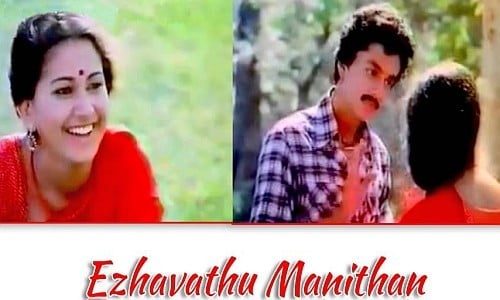
Ezhavathu Manithan (Eng: The Seventh Man) is a 1982 Indian Tamil film co-written and directed by K. Hariharan. Inspired by a real-life incident, the film focuses on environmental pollution and exploitation of industrial workers. Starring Raghuvaran in his first lead role, it features a host of newcomers playing other prominent roles. The film’s soundtrack was made up from an album composed by L. Vaidyanathan with the lyrics of Tamil poet Subramania Bharati.
The film met with widespread critical acclaim upon release, winning the National Film Award for Best Feature Film in Tamil and two Tamil Nadu State Film Awards. It was screened at the Indian Panorama of the International Film Festival of India, and in the Soviet Union, where it won the Afro–Asian Solidarity Award. At the 13th Moscow International Film Festival in 1983, the film was nominated for the Golden St. George prize.
Anand, a skilled engineering graduate, comes to a village from Madras to work in a cement factory. He is shocked when he learns about the exploitation and mistreatment of the workers there. Arjun, the corrupt manager of the factory, takes half of the wages from every worker as his commission. Anand complains to Ramkumar, the son of the factory owner, who used to be a college friend, and Ramkumar gives Arjun a warning. Meanwhile, Anand befriends Senthamari, a labourer in the factory, and is attracted to Gowri, Senthamari’s sister.
Gowri has not told anyone that she is affected by a lung disease caused by air pollution. Sudhakar, another labourer in the factory, is affected by the same disease. Dr Prema, a government doctor, informs Sudhakar that the disease has advanced and he needs to be treated in Chennai. Kulashekara Perumal, the factory owner, refuses to provide treatment to Sudhakar, resulting in the latter’s death. A distressed Anand pleads with the management to look into the issue and to provide the employees with benefits that they are entitled to receive, but he is refused.
Ramkumar tries to get the doctor who treated Sudhaker to issue a false certificate of death, but she refuses. Dr Prema also lets Anand know that she reported the death to the government health ministry, but nothing will be done about it because Ramkumar has bribed all the officials. Anand tries to speak with Ramkumar, but he beats him up. Anand establishes a union at the factory and calls a strike. When Senthamari leaves town to start another job, Ramkumar chases after him and murders him. The new factory manager, Settaya, arranges for Ramkumar to lay low in Chennai, while he buries Senthamari’s body in the factory.
All the management’s attempts to get Anand to call off the strike fail. Settaya files a police report against Anand, accusing him of the attempted murder of Ramkumar. He also promises the factory workers that he will build a new chimney to reduce the air pollution if they call off the strike. A lawyer who is supportive of the factory’s trade union bails out Anand and alerts the government to the factory’s poor environmental record. The management decides to blow up the factory and claim the insurance money. However, their plan backfires as Anand and his friends spot most of the bombs and dispose of them. The one bomb that they do not remove is in the room where Settaya is hiding; he dies in the subsequent blast. Anand and the rest of the workers assume control of the factory. Dr Prema informs Anand that Gowri will recover from her illness.
Directed by K. Hariharan
Produced by Palai N. Shanmugam
Written by Somasundareshwar & Arunmozhi (dialogues)
Screenplay by K. Hariharan
Story by Arunmozhi
Starring Raghuvaran, Rathna
Music by L. Vaidyanathan
Cinematography Dharmma
Edited by K. N. Raju
Release date 11 June 1982
Running time 120 mins
Country India
Language Tamil

